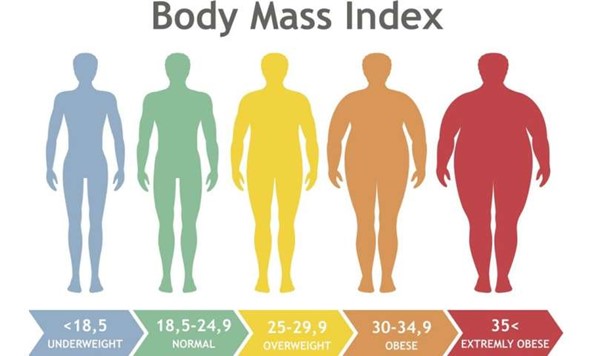Obesity Control Nurse Specialist
Submitted by Mehreen Aslam
Tags: Body Mass Index Obesity Weight

Obesity is a complex state described by excessive body fat. It is an ailment that increases the risk of emerging severe illnesses like heart and metabolic disease. According to WHO report 2020, approximately 2000 million adults are overweight and 500 million are obese worldwide, comprising 11 % men and 15 % women, or more than half a billion. Overweight and obesity have increased dramatically in the last 40 years. Obesity can easily be managed by choosing a healthy meal, more regular exercise, and controlling oneself.
Consumption of unhealthy fast food has increased as a result of industrialization, computerization, and economic success. With every convenience available at the touch of a button, physical activity has taken a back seat. Because people don't have time to cook food and they usually preferred processed and ready-to-eat foods.
Obesity is usually diagnosed using the mass index, by multiplying weight (Kg) and height (m). A BMI of 23 or above may raise the chance of developing health problems. A person's also waist circumference gives a good idea of body fat. Men with an abdomen circumference of far greater than 40 inches (102 cm) and women with greater than 35 inches (89 cm) are more probable to have obesity.

Causes of Obesity
Obesity is caused by non-modifiable causes like genetic, metabolic, and environmental factors as well as modifiable causes like dietary, activity level, and fitness preferences. Obesity is developed by consuming more calories than required by eating fatty and sugary meals. The body accumulates the additional calories as fat. Obesity is prevailing by adopting modern lifestyles, comprising of consuming excessive amounts of low-cost, high-calorie, and low-nutrient food like fried and bakery foods and spending much time sitting at desks or on sofas.
Obesity-related Issues
Obesity can lead to plenty of other concerns, such as difficulties accomplishing routine daily activities and other health problems including tiredness, excessive perspiration, snoring, fatigued, varicose veins, joint and back discomfort, and low image and self-esteem. Obesity-related psychological issues can wreak havoc on social relations that may trigger depression.
Managing Obesity by Obesity Control Specialist Nurse
A nurse specialist who specializes in the treatment of obesity develops a treatment plan that includes a client's food diary and activity recommendations. Customers adopt healthy living practices and receive regular counseling. By assisting a client, a nurse specialist can inspire positive behavior change while also developing self-efficacy. Furthermore, the nurse emphasizes the need for stress management, exercise, and interpersonal relationships. People's self-efficacy is crucial for initiating and maintaining behavioral changes.
People who receive nurse consultation will adopt healthier lifestyle habits and thereby enjoy longer, more rewarding lives. According to studies, as an obese person's lifestyle changes, their metabolic and psychological outcomes improve.
Nurse specialists help to identify people who are fat or at risk of becoming obese. She creates a plan for each based on their specific requirements and interests. Furthermore, she arranges client meetings through support groups or persons who have successfully managed their obesity for their clients' ongoing inspiration. She enable the client to perform the exercise for 30 minutes daily, eat a well-balanced diet and reduce unhealthy foods (fast food, refined grains, sweets, and red meat) and beverages (sugary juice and carbonated drinks). Eating slowly and avoiding circumstances where one could be tempted to overeat is also beneficial for them. Aerobics and high-intensity exercises are also encouraged for morbid obesity under the supervision of dieticians and fitness trainers. Regular exercise helps with weight maintenance even after losing weight and can improve the health consequences of obesity.
In the nutshell, Obesity Nurse Specialists prevent obesity by encouraging clients to practice self-control and regular monitoring, such as eating a low-calorie, balanced diet and engaging in 30 minutes of regular physical activity, such as brisk walking, jogging, or swimming.
Further studies
- Guerrini Usubini, A., Varallo, G., Granese, V., Cattivelli, R., Consoli, S., Bastoni, I., ... & Molinari, E. (2021). The impact of psychological flexibility on psychological well-being in adults with obesity. Frontiers in Psychology , 12, 636933.
- Blüher, M. (2019). Obesity: global epidemiology and pathogenesis. Nature Reviews Endocrinology , 15(5), 288-298.
- World Health Organization. (2020). Overweight and obesity.
- Mehreen Aslam is currently enrolled in MSc N at Aga Khan University. She holds a degree in MS Community Health and Nutrition and a bachelor's degree from the University of health sciences Lahore. She has been deployed as a public health Expert in DRC, Africa in 2020. She is developing expertise in the area of public health and is keenly interested in highlighting preventable health issues for community health promotion. She has previously 4 publications in peer-reviewed journals.